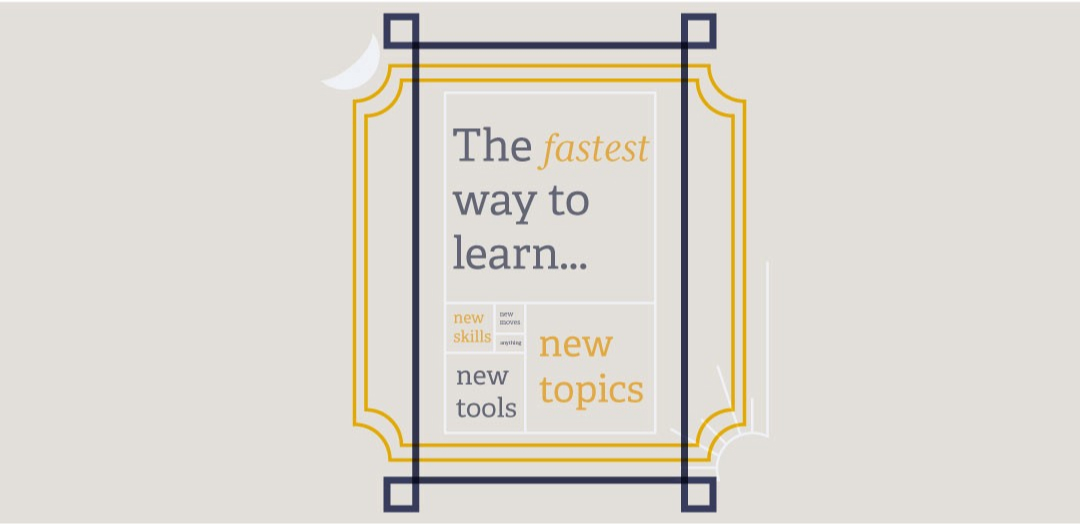You’ve got to be able to stand in public and recite a 4,000 word essay on the topic from memory to 2,000 people.
Just kidding, but if you were able to do it, I would be impressed.
Having that much to say about something shows that you either know it so well you could write a book, or that you really don’t know it well enough, otherwise you’d be able to explain it in it’s simplest form.
You might find yourself spinning your wheels trying to learn things like:
Using a new design tool or software
Using a new technique
A particular style of design
Learning to see what is wrong
Learning how to properly talk about design
There are a few techniques and processes here that will help curb that 10,000 hour rule for mastering new skills.
Being a quick learner is more than just being able to quickly solidify facts in your brain. You need to filter information quickly, grab the important parts, and use that info for something as soon as you can.
In order for a new idea or technique to really resonate with you, it has to either hit your struggle dead on, or you have to have been exposed to it at least 5 or 6 times before to fully take it in.
Repeated exposure is a longer process because the message you need to hear might not always come from the same source twice.
Should someone be teaching a topic, and you notice a message being said a few times. Take note.
If you recognize that a new idea is being repeated around you, the act of noting it could accelerate your learning from a few months down to a few weeks.
This is why I’ll go back and re-watch/re-listen to talks about design. I need to hear this information several times to be able to keep it.
But if you are trying to find more information from, make sure that the person that’s teaching it truly does know more than you.
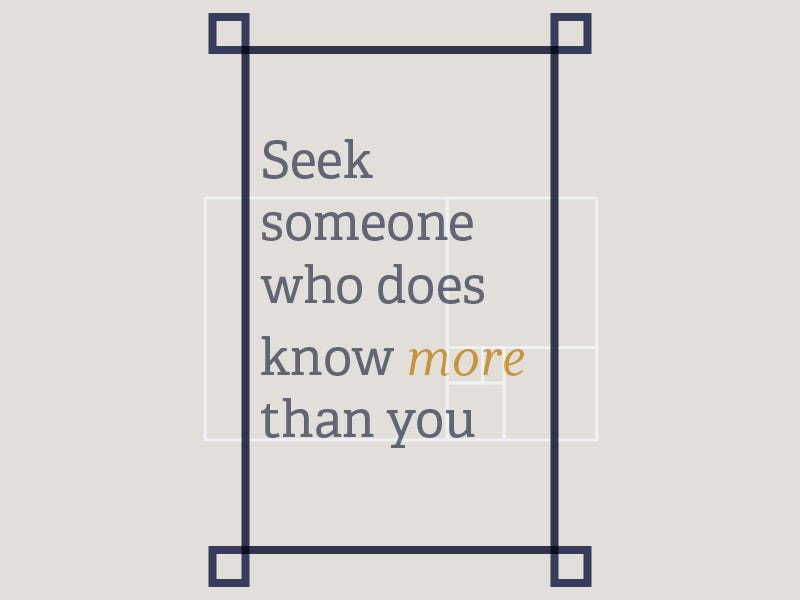
Seek out others to learn from
But choose your mentors wisely
As a creative professional, I would hope you are capable of making good decisions especially when it comes to your design education.
It can be difficult to find clear guidance on our where to go in the industry. One of the best ways to figure out where to go so is to find people on social media who work in your area of expertise and follow their work.
Mentorship can be done in person, or impersonally.
What I mean there is, you don’t have to know the person and have face to face conversations in order to be able to learn from them. Hopefully, the people you look up to in your industry are:
focused on growing their own skills
focused on teaching what they know to other people (through video, writing, talks, coaching or any of the above)
focused in a specific area or niche
within a few arms reach of where you are currently
Taking some time and seeing what happens in someone else’s world is great. If you actually do interact enough through social manners, and the person you follow currently doesn’t teach on an area you are interested in learning from them, it can be okay to ask if they can mentor you personally.
This kind of relationship is not one to ask for out of the blue.
Relationships like this require some trust and recognition on both sides of the party. The Mentor has to have enough knowledge of what you are trying to learn, and that The Mentee (you) need to be capable and willing to take direction, act upon it, and continue giving feedback to your mentor.
A Mentor/Mentee relationship is mutually beneficial because the it gives you direct feedback for where you are at currently and gives them feedback on if there are holes in their process.
But I also told you it doesn’t have to be in person. If there is enough of their work, lifestyle and growth shared from them, you are capable of consuming valuable content like this from them until the above relationship has been built up.
Be careful though not to dignify them as a god-like person. Even though they do great work, they are human beings like you, and have had to go through similar struggles like you.
They are ‘you,’ just a few steps down the road.
The next form of learning is similar to finding good people to learn from, but equally dangerous if not done properly.
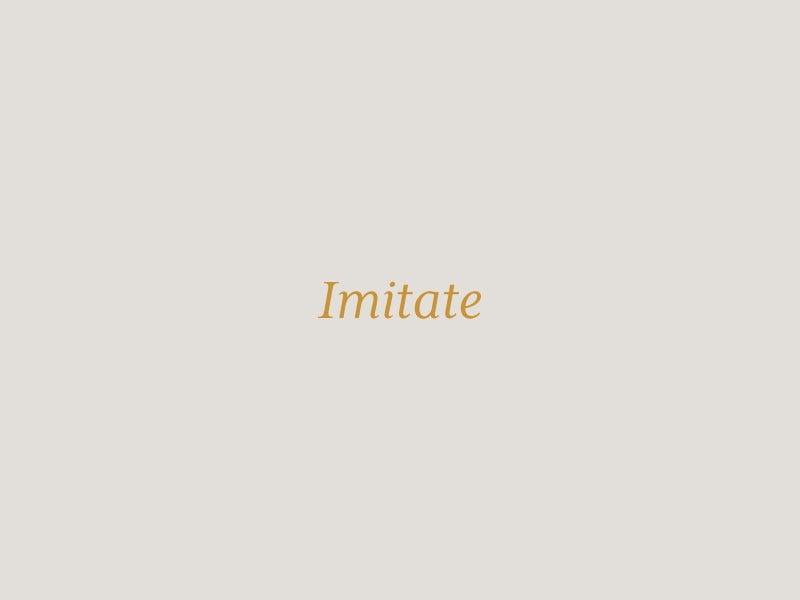
The hawk and the mockingbird
“‘First of all,’ he said, ‘If you can learn a simple trick, Scout, you’ll get along a lot better with all kinds of folks. You never really understand a person until you consider things from his point of view-’ “— Harper Lee
Hopefully with enough time following the people you look up to, you are able to start taking the advice they share; whether that be personally to you, or to you as their audience.
Once you start to take their advice, a bit of mimicry starts to occur. How you approach using their tips, tricks, style techniques, etc. will determine whether you’re a hawk or mockingbird.
The Hawk
Hawks are birds of prey, and while they are young, they don’t have all the skills yet to get their own food. So instead, some of them will choose to mimic the style and sounds that others make in order to attract food to them. This type of call tricks other animals into thinking it’s really one thing, but in fact is something that lacks skills on it’s own.
The Mockingbird
The mocking bird will learn from it’s environment and pull sounds from various sources. Though at times, it may seem that they have a favorite song to sing, they do so without the intent to trick other animals in a malicious manner, and instead are using what they learned to show intelligence and develop it’s own style, a repertoire.
They will continue to learn new styles of sounds as more things come available into their environment, further increasing the intelligence of the bird.
This can be you as a designer.
You can blatantly copy the work of others, tricking others into thinking you actually have skill and thus gaining clients/followers/interviews… etc. But at some point the tricks stop working and you are shown for what you really are.
This can happen too if you’re copying work you’ve studied and putting it out as if you did it yourself. This is not okay.
What you should be doing is be working on your skills, and the best way to do so is to find something you like and try to do something similar. Obviously the more you are able to learn from and do will ultimately show your skillset when you start creating original works.
You’ll adopt more styles until you have something inspired by others but is more uniquely your own.
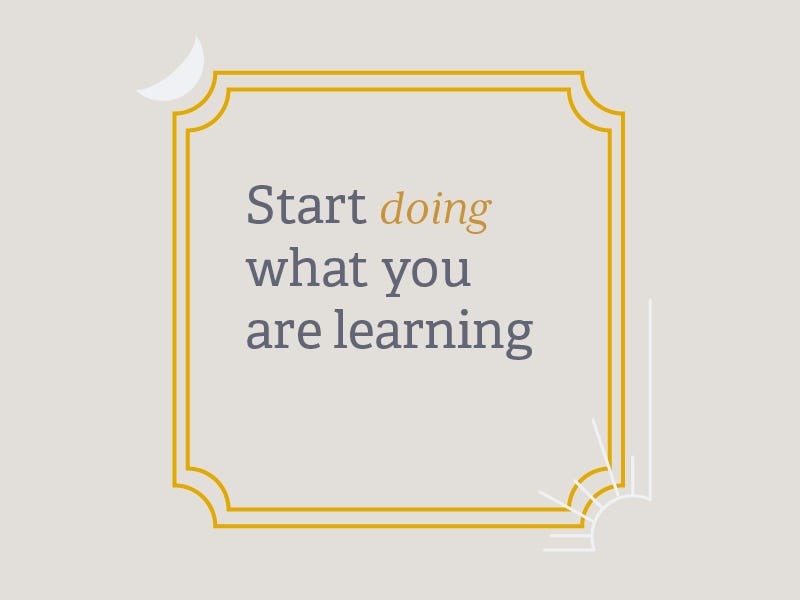
Don’t just internalize the things you learn
You want to make sure that if you learn how to do something, you actually put it into practice.
What good is a carpenter’s tools if they never get used?
There is some magical, science-y, medical thing that happens when you start taking things you learn and physically take that idea from your brain and put it out onto the paper or screen.
You are using that part of your brain where the memories holding those new concepts/ideas connect with your motor skills and reasoning skills.
Imagine if a pro athlete got into the major leagues by only visualizing what they had to do instead of using their body to physically practice that skill.
If you find one of them, you need to do what you can to find them and learn from them. If you can’t find one, you might need to actually find a way to practice what you are learning.
There’s probably more science behind this, but you need to be able to do the things you say you can. But when you are learning, there’s another crucial part to this.
Evaluate the success of the things you are doing, and don’t be afraid to seek out feedback.
Feedback is just as crucial as practice.
Imagine if you spent the next 5 years practicing something only to realize you were doing it wrong. Not only do you have to find the correct path to go down, you have to unlearn 5 years of bad practice.
In our community for the Compass of Design, we have a channel specifically for #design-review. If you are in the community, make sure you to use it for anything you are working on and trying to improve.
I moderate the chat, so you will get constructive feedback from me, and anyone else in the community that can help.
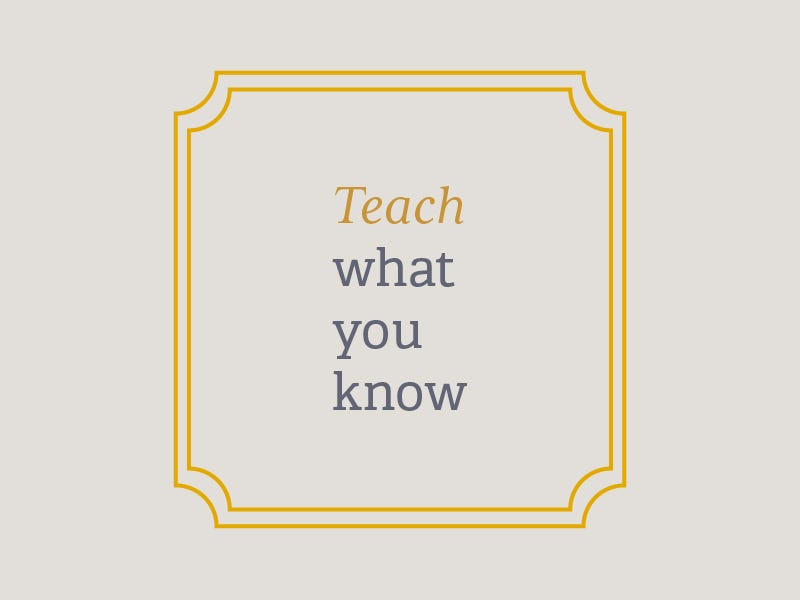
Those who can, do.
Those who want to perfect their craft, teach.
So there’s a mentality with designers that think those who can’t design try to teach it instead.
While this can be true in some cases, you can spot those people a mile away.
This shouldn’t discourage you though. You should start teaching what you know.
Just like when you seek out someone who knows more about a topic than you, other people are going to be looking to learn from people like you as you continue to grow your skills.
The fastest way for you to grow is to teach what you know.
For every struggle that you have had going through your career, there’s a person right now that is experiencing that same thing.
But your unique perspective on how you overcame that can be an invaluable resource to someone who’s just a few steps behind you. The fact that this struggle was so recent makes you a lot more relateable than someone who is decades ahead of another person.
By teaching from where you are at right now, this does two things: it humanizes you, helping you to build relationships with your audience and it quickly establishes yourself as an expert on the topic.
It has never been easier to put something out online.
You have blog platforms, your own website, online communities, YouTube, online course platforms and workshops… what you choose is up to you.
Just focus on the topics that you know about. Where people get into trouble is when they are positioning themselves as experts on topics they know nothing about.
Hopefully as you are learning from others, you’re taking some of the steps above and have experience trying things out from the people you admire.
This experience can be super helpful to others as it becomes a part of your process. You just have to start.
I give you full permission to suck at teaching.
The thing is, it’s not very easy to teach, and it’s even harder to put out things you make to the public. The reality is, you will get both positive and negative reactions. You have to be able to power through that. What you’ll find as you start, that your communication skills will be improving the more you start teaching what you know to other people.
How do you start teaching what you know?
You’ve got to have a good understanding of what you do and why/how you do it.
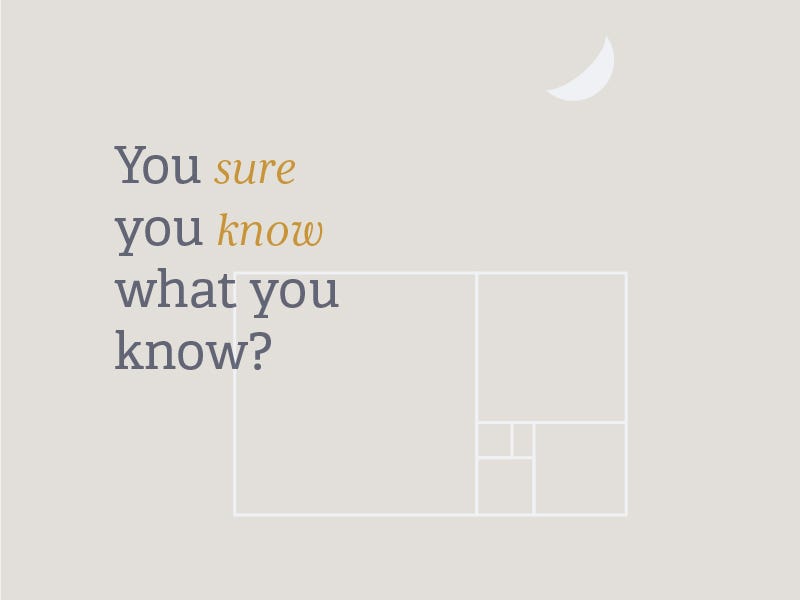
One of the people I look up to in business as a designer has hit the nail on the head with this topic. His name is Chris Do, and he runs “the futur” where he shared his thoughts on this topic.
This is heavily paraphrased, but you can watch it here
“You might not know as much as you think you know… Knowing how to do something does not equal understanding. You may know design, but that doesn’t mean you understand how to talk about design to another person. You might not even understand your own process. Creatives torture themselves working all night to get their idea out. It’s not that they have a better process to sit there and grind it out; so examine your process and you will work faster.”
To learn you need to get out of your comfort zone.
Something you’ve accepted as something you know might turn out is arbitrary and might not actually be good design.
What criteria are you using to judge whether something is good design or bad design?
Break down your thought own thought process to figure it out and learn from yourself.
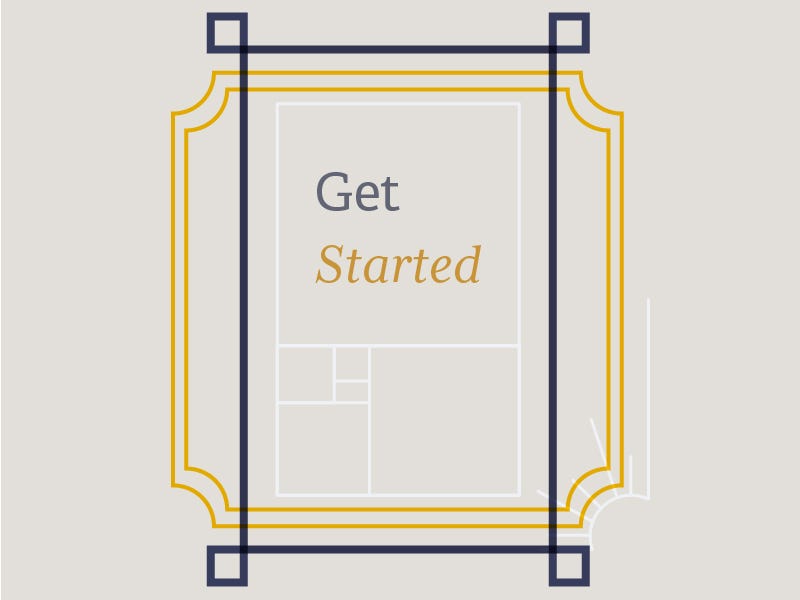
Are you ready now to start becoming a better learner?
What about a better teacher?
I have some resources here that will help you get started.
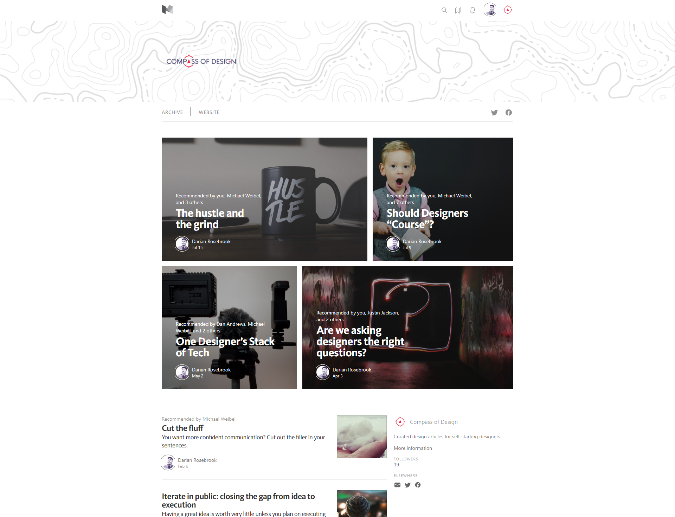
Start Writing
Our platform for the Compass of Design is where we share plenty of resources for learning about creative entrepreneurship.
We use Medium to write for the Compass of Design. This is a community publication, so anyone who’s in the Compass of Design community can submit their writing to it with one condition:It has to be geared towards helping someone with their career as a designer.
Check out all our articles at read.compassofdesign.com
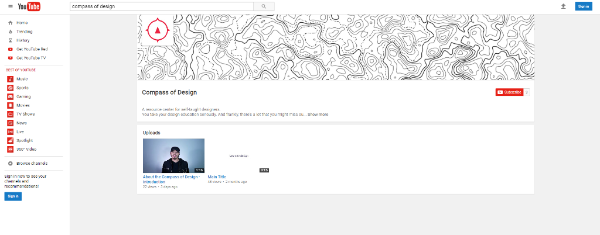
Youtube is a viable option.
At any point you can open up your camera on your phone and start talking about what you know.
The thing is it takes a lot to start putting video out there of yourself or your designs, but as you continue to do so, you’ll get better and better at communicating your ideas and better at speaking in general.
We have a YouTube channel started for the Compass of Design in it’s infancy stage. I will focus on delivering shorter design snacks for you all on there in the near future.
You can start small. Even just a 3–5 minute video can help someone out, even if you just recorded it with your phone.
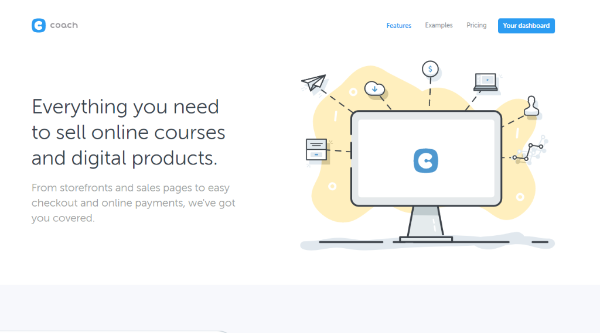
Go deeper
For those of you who have the ability to teach in depth on content, the platform that I use to host course content and design resources is **Coach.**
It’s one of the best platforms I’ve seen for people who want to do things like email courses, online courses, and sell digital goods. That link is an affiliate link, but I want you to know I wouldn’t share it if I didn’t actually think it can help you.
It’s super easy to get things started, linked up and start hosting free content, paid content and take in payments. So if you don’t want to build that yourself, definitely take a look at Coach. If you have any questions you can ask me, (and they have a super handy chat system and they respond super fast.)
Why would I share what I know?
You’ll find that, even with all the difficult processes of getting something out there, sharing what you know is by far the quickest way to master something you are trying to learn.
You need to be able to know if what you are learning has any practical application to your life. So by taking what you know, bottling it up in a manner that people can consume it easily, you’ll start running laps around the ones who aren’t willing to share what they know.
I hope that as the years go by, I can help people by sharing what I know, and let them know that it really isn’t as scary as you make it out to be.
My challenge to you:
Share something you’ve learned today with at least 1 other person.

Want to level up your design skills?
You are not alone, every week we go over ways to market yourself better by improving your design skills, your personal brand, and other topics to further develop yourself as a designer…
We’re building a community for the designers like you.
The Compass of Design Community is a growing place of positive and driven designers who are working at being masters of their craft. Whether you’ve been designing for years or are just getting started on your journey, you will find the community is a great place where you can get the critical feedback on your work and connect with like-minded, motivated people.
Check out the Compass of Design Community, one of the best places for designers to get together and level up (:
